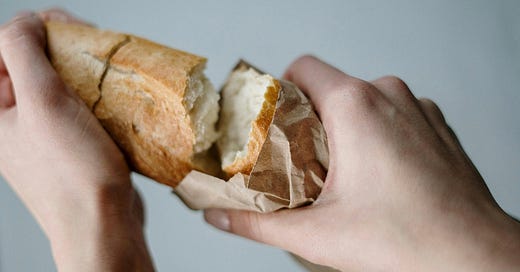
It became apparent my experience of breaking bread is different whilst reading an Instagram post during COVID bemoaning how limiting it was being unable to freely share food with friends. I had a Bane-esque epiphany: “You merely adopted not sharing food freely; I was born in it, molded by it.”
The post highlighted the ability to engage in such an integral act isn’t given a second thought by many. Those with food hypersensitives, however, aren’t blessed with that scenario. (COVID unknowingly gave a peek into many of our normal—not ‘new normal’—lives.)
These thoughts surfaced then lay dormant until I came across a term used in an allergy research project: commensality (an anthropological term meaning ‘eating together’).
A lightbulb went off. The term elucidated a common thread of why things for me are different. From friends’ birthday celebration meals at Chinese or Indian restaurants where I would just be an uncomfortable onlooker to being openly mocked for my limitations in communal meal settings.
Eating together is often seen as a focal point, facilitating a coming together. But, it can be viewed as the complication for those with food hypersensitivities: Will they be eating my allergens? How long can I go without eating before I become unpleasant to be around? Can I wash my hands before eating? And so on. . .
Breaking bread and/or commensality are essential ways of deepening bonds with those you know and integrating with those you don’t—as well as facilitating a reduction in tensions or settling disputes. Days, nourishment, and life itself are structured around and dependent on those acts.
It can be perceived as rude if you were to refuse to fully participate in breaking bread when assimilating into a new culture, whether during a trip or a full relocation. It may be harder to get the ‘authentic experience’ when travelling.
For example, many (quite rightly) want to try the places the locals go, the hidden gems, but the sad reality is it can feel safer to go to one of the global chains. Instead of delving into the wonders of local cuisine I often chose safer options such as McDonald’s—having to go there in Venice felt the most vulgar of the bunch.
I’ve found an inverse relationship between the number of bad experiences and reactions and my propensity to engage in commensality (outside of rather limited, specific contexts). Due to this being the main way to get together, socialising can take a proportionate dip.
Everyone has their burdens which cause preoccupation. Those who can’t walk may view how I take walking for granted in a similar way to how I view people who can break bread without a second thought; perhaps there’s a tinge of envy, but at the same time an acknowledgement that we wouldn’t want others to have our limitations.




